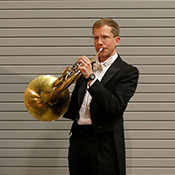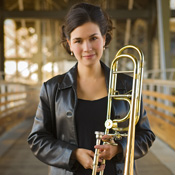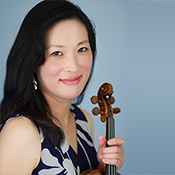
MSO Musician Spotlight: Dietrich Hemann on a Life in Music
David Lewellen
PUBLISHED
Tagged Under: French Horn, MSO Musicians
Even though almost every piece Dietrich Hemann plays says “Horn II” at the top, he still has to be versatile.
“Being a good second horn player is a state of mind,” said Hemann, who has held that position in the Milwaukee Symphony since 2008. “It’s an attitude of collaboration and deference to what the first horn is doing and helping the first horn and section sound better.”
For complicated historical and traditional reasons, composers usually write the first and third horn higher than the second and fourth horn. “Second is technically a low position, but there’s also a bit of everything,” Hemann said. “Bruckner writes high; so does Shostakovich. John Williams, it’s top to bottom, high to low, doubling the first horn except for the solos.”
But aside from supporting the section, Hemann gets some moments alone — he rattled off Beethoven, Brahms, and Mahler as composers who give him a little independence. “If you’re looking in the wrong place in the orchestra, you might miss it,” he said, “but it’s definitely important to the second horn player.”
“Dietrich is the ideal second horn,” said MSO principal horn Matthew Annin. “He could play any position in the Milwaukee Symphony, or in any horn section. He can do it all. He has great flexibility and versatility.” In general, he said, the second horn is “the workhorse. You don’t get a lot of pieces off, but Dietrich enjoys being in the fray. Whatever comes, he handles it with grace.”
But Hemann gained most of that mentality after he began his professional career. In school settings, he pointed out, the best horn players usually play high. “But when you’re freelance, you have to be able to play anything,” he said. “When you’re taking auditions, you don’t want to eliminate half the jobs.”
Hemann began playing trumpet as a child in Albany, California, but soon gravitated to the horn. He studied at the Eastman School of Music and Rice University’s Shepherd School of Music and played three years in Barcelona before returning to the United States to join the Rochester Philharmonic. There he began dating Megumi Kanda, who won the MSO’s principal trombone audition in 2002. Two years later, he moved to Milwaukee, they got married, and he began looking for local freelance work.
To build a freelance career, “all that really matters is how you play,” he said. “It’s difficult for anyone to hire you if they haven’t heard you.” But he offered to play for section principals in regional orchestras and the Lyric Opera of Chicago and began to pick up gigs. And from meeting musicians in more groups and making more contacts, “it can snowball in your favor.”
He also began subbing in the MSO and was hired as a long-term substitute in 2007 when a vacancy opened up in the horn section. Several months later, he won the permanent job. He remembers the audition vividly — he missed a note in the preliminary round, but advanced to the semifinals anyway. Before the final round, when candidates play with the entire section, “I was only hoping that I didn’t embarrass myself.”
Some time after he won his MSO position, Hemann also began playing as an extra with the Chicago Symphony when his Milwaukee schedule allows. But he is much more selective now about outside work. “When you’re young, you want to fill up the calendar at all costs,” he said. “Now I know that I might regret accepting something just because it fit.”
He and Kanda also have family responsibilities, with three sons ranging in age from a college freshman to seventh grade. The babysitter era of their lives ended after the pandemic, but for many years, childcare was a preoccupation. “We had a whole rotation of nighttime sitters, and we would have to piece together the schedule every month,” he said. “And there were a couple of scary moments.”
They still remember the time when the sitter didn’t show up less than one hour before a concert, and in desperation they called out the door to ask a neighbor walking her dog if she was free. The neighbor said yes, took her dog home, and came back and watched the kids until the concert was over.
The family lives in Shorewood, in a neighborhood they love because “people look out for each other.” When he’s not playing, Hemann likes to read, ride his bike, and play word games and sudoku.
“Megumi and I feel very fortunate to play in the same orchestra,” Hemann said. “Especially when the kids were littler, that was our time to talk. Going to work was the easy part of our day.”



